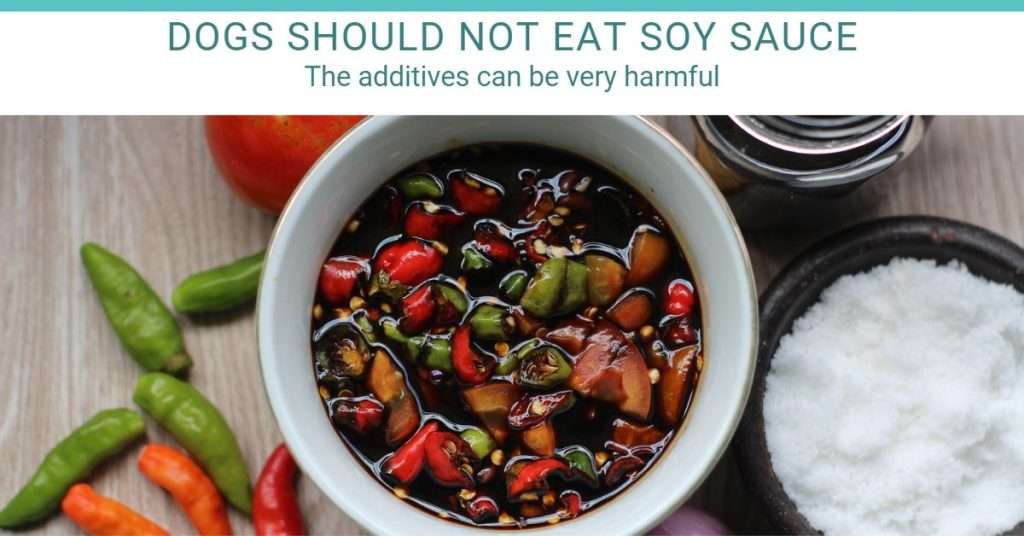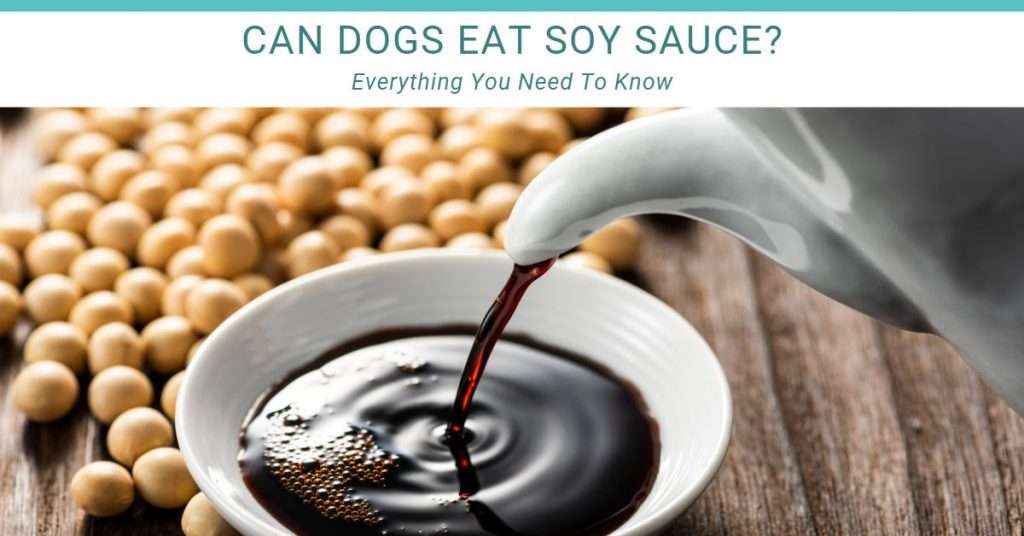Soy Sauce Secrets: Impact on Dogs’ Health
As a new dog owner or a concerned pet parent, it’s crucial to understand what foods are safe for your furry friend. In this comprehensive guide, we’ll uncover the truth about soy sauce and whether it is safe for dogs. So, let’s dig in and explore the world of soy sauce and its potential impact on our canine companions.
Understanding the Canine Diet
Before delving into the topic can dogs eat soy sauce, it’s essential to grasp the dietary needs of dogs. Dogs require a balanced and nutritious diet to thrive and lead a healthy life. While there are many human foods that dogs can safely enjoy, it’s equally important to be aware of foods that can be harmful or toxic to them. Some human safe foods can kill a dog in a very short amount of time while others can just cause some GI issues or other potential problems.
What is soy sauce?
Soy sauce is a popular condiment commonly used in various cuisines worldwide. It is made from fermented soybeans, roasted grains, water, and salt. This savory and flavorful sauce adds depth to many dishes and is a staple in Asian cooking. This condiment is very high in sodium or salt.

Is Soy Sauce Safe for Dogs?
The primary concern is whether dogs can eat soy sauce without any adverse effects. While a small amount of soy sauce may not be immediately toxic to dogs, it is generally not recommended to include soy sauce in their diet. Can soy sauce kill a dog, if left untreated and a large enough amount is consumed, sadly it can.
The main issue with the soy sauce is the excessive amount of sodium.
Apart from sodium, soy sauce contains other ingredients that may pose risks to dogs. Soy and wheat, which are common components of soy sauce, can potentially trigger allergies in some dogs. Additionally, certain additives present in soy sauce may not be suitable for dogs’ digestive systems.
The Dangers of Excessive Sodium
One significant issue with soy sauce is its high sodium content. Dogs are more sensitive to sodium than humans, and excessive sodium intake can lead to health problems. Consuming foods with high sodium content can cause dehydration, electrolyte imbalances, and put strain on their cardiovascular system.
How much soy sauce is toxic to dogs?
The toxicity level of soy sauce for dogs depends on various factors, including the size of the dog and the amount ingested. While there isn’t a specific threshold that defines exactly how much soy sauce is considered toxic, it’s important to understand the potential risks associated with this condiment.
One of the primary concerns with soy sauce is its high sodium content. Dogs are more sensitive to sodium than humans, and excessive sodium intake can lead to health issues. Consuming large quantities of soy sauce can cause dehydration, electrolyte imbalances, and put strain on a dog’s cardiovascular system.
As a general guideline, even a small amount of soy sauce is not recommended for dogs. It’s best to err on the side of caution and avoid feeding soy sauce to your furry friend altogether. Remember, dogs have different dietary needs and sensitivities compared to humans, and some foods that are safe for us can be harmful to them.
If you suspect that your dog has ingested soy sauce or any other food in potentially toxic amounts, it’s essential to seek veterinary care immediately. Contact your veterinarian and provide them with information about the quantity of soy sauce your dog may have consumed and any visible symptoms or changes in behavior.
What Should I Do if My Dog Eats Soy Sauce?
If you find yourself in a situation where your dog has consumed soy sauce, it’s important to take appropriate action promptly. Here are the steps you should follow:
- Assess the Quantity Consumed: Determine how much soy sauce your dog has ingested. If it’s only a small amount, the risk may be relatively low. However, if your dog has consumed a significant quantity, it’s best to be cautious and seek professional advice.
- Contact Your Veterinarian: It’s crucial to reach out to your veterinarian immediately. They are the best resource to provide guidance tailored to your dog’s specific situation. Inform them about the quantity of soy sauce your dog has consumed, any visible symptoms, and any pre-existing health conditions your dog may have. Your veterinarian may or may not want you to induce vomiting.
- Observe Your Dog’s Behavior: Keep a close eye on your dog for any signs of distress, such as vomiting, diarrhea, excessive thirst, restlessness, or changes in behavior. Note down any unusual symptoms or behaviors to report to your veterinarian.
- Follow Your Veterinarian’s Recommendations: Your veterinarian may provide specific instructions based on your dog’s condition and the quantity of soy sauce ingested. They may advise you to induce vomiting if the consumption is recent or suggest other appropriate steps to mitigate any potential risks.
- Provide Supportive Care: Follow any recommended supportive care instructions provided by your veterinarian. This may include keeping your dog well-hydrated, monitoring their vital signs, and maintaining a calm and stress-free environment. Please be sure to have an ample supply of fresh clean water that is accessible toy our dog.
Remember, it’s always better to be safe than sorry when it comes to your dog’s health. Even if the soy sauce ingestion seems minor, consulting with your veterinarian ensures that any potential risks are addressed promptly and appropriately.
Soy Sauce Allergies in Dogs
Like humans, dogs can develop allergies to certain foods, including soy sauce. Symptoms of food allergies in dogs may include itching, digestive issues, ear infections, and skin problems. If you suspect your dog has a soy sauce allergy, consult your veterinarian for proper diagnosis and guidance.
Can Dogs Taste Soy Sauce?
Dogs have taste preferences, and their ability to taste certain flavors differs from ours. While they may have a sense of umami, which is the savory taste associated with soy sauce, it doesn’t mean they need or should consume it. Dogs can find satisfaction in their meals without the addition of soy sauce.
Safe and Healthy Alternatives
If you’re looking to enhance the flavor of your dog’s meals, there are safe and healthy alternatives to soy sauce. Natural flavor enhancers like bone broth, or small amounts of dog-safe herbs and spices can add variety to their diet without compromising their health. You can also add some crunch which many dogs like. Fruits such as pears or nectarines can add a nice amount of crunchy to your dogs meal. You may also want to try some dark green vegetables such as broccoli or kale to their diet for the added vitamins.
In conclusion, while soy sauce may not be immediately toxic to dogs, it is generally not recommended to include it in their diet. The high sodium content and potential allergens present in soy sauce can pose risks to their health and well-being. As a responsible dog owner, it’s crucial to prioritize their dietary needs and consult with a veterinarian for any specific concerns or questions regarding your dog’s diet.
Remember, the best way to ensure your dog’s health and happiness is by providing them with a balanced and nutritionally complete diet tailored to their specific needs. The key takeaway is that you should not allow your dog to eat soy sauce, don’t panic if it had some, but it should not be part of your furry friends normal diet. Prevention is always better than a cure. Please do not leave soy sauce packets or open containers of soy sauce accessible to your dog. Your veterinarian can guide you in making informed decisions about what foods are safe and suitable for your beloved furry companion.
Can soy sauce cause diarrhea in dogs?
When dogs ingest high levels of sodium, their bodies try to compensate by pulling water into the digestive tract. This increased water content can result in loose stools or even diarrhea. Additionally, the presence of other ingredients in soy sauce, such as soy and wheat, may also contribute to digestive upset in some dogs, further exacerbating the risk of diarrhea.
Can Dogs Eat Fried Rice with Soy Sauce?
While plain cooked rice in small quantities can be a safe addition to a dog’s diet, the inclusion of soy sauce raises concerns. As mentioned earlier, soy sauce contains high levels of sodium, which can be harmful to dogs, especially in excess.
Additionally, fried rice often includes other ingredients such as onions, garlic, vegetables, and sometimes even seasonings like MSG, which are not suitable for dogs. Onions and garlic, in particular, can be toxic to dogs and should be avoided.
Therefore, it is generally not recommended to feed dogs fried rice with soy sauce. The combination of high sodium content, potential allergenic ingredients, and the risk of toxic ingredients makes it an unsuitable choice for your furry friend.



